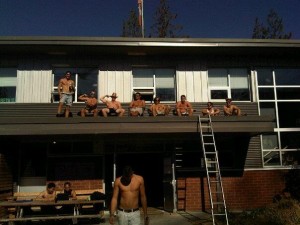Adrienne Rich, in her article, “Compulsory Heterosexuality and Lesbian Existence,” outlines her theory about women, and how every woman exists somewhere on the “lesbian continuum.” Rich’s continuum includes all women, whether they identify as lesbian, straight, or otherwise, and accounts for both sexual and non-sexual experiences between women. As well, some women may move from one point on the spectrum to another during the course of their lives. The idea behind the continuum is that we should “begin to discover the erotic in female terms: as that which is unconfined to any single part of the body or solely to the body itself, as an energy not only diffuse but omnipresent in ‘the sharing of joy, whether physical, emotional, or psychic (650).
This weekend I attended a UBC fraternity semi-formal, and, having read Rich’s article, I believe this was a prime example of how Rich’s continuum can be applied to men as well. The Brothers of this fraternity were definitely well bonded, and fond of each other. The company of the party ranged from new members, to alumni that had come to catch up with old friends and meet new members. There was definitely a warm vibe of comfort around each other, and several acts of care between the boys, despite some of the most stereotypically ‘frat’ boys that were in attendance. This is not to say that the idea of the fraternity is in any way homosexual, although I have definitely heard that being implied by others. What I am trying to point out is that there was a definite continuum to be seen within the fraternity brothers, which demonstrates Rich’s theory of the Lesbian Continuum.
Although the boys had brought dates to the party, with whom they were conversing with and enjoying the company of, it was very apparent that a large part of why they were there was to spend time with each other. Pockets of Brothers were dispersed around the room, each enjoying the evening together in different ways. It was interesting to see the contrast of behaviour with individual Brothers when they were with their dates, versus when they were with their Brothers. Rich explains that women can move from one point in the continuum to another at different points in their lives. What was interesting about the semi-formal was to see how the Brothers were moving along different points in the continuum within one evening. Being at the semi-formal was like seeing Rich’s continuum in fast-forward.
I enjoyed spending the evening with this group. I was able to have a night out with a group of people whilst simultaneously witnessing this theory come alive. Yet one more way that I’ve learnt to incorporate sociology into my daily life!
